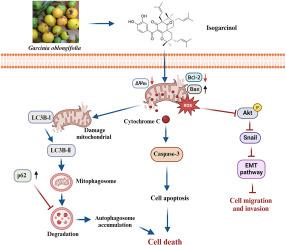当前位置:
X-MOL 学术
›
Phytomedicine
›
论文详情
Our official English website, www.x-mol.net, welcomes your
feedback! (Note: you will need to create a separate account there.)
Isogarcinol inhibits nasopharyngeal carcinoma growth through mitochondria-mediated autophagic cell death
Phytomedicine ( IF 6.7 ) Pub Date : 2024-05-18 , DOI: 10.1016/j.phymed.2024.155745 Jing Li 1 , Xi Shen 2 , Chunhui Sun 3 , Yibo Hou 1 , Ya Hu 4 , Shaohua Ma 1 , Laiqiang Huang 1 , Lan Ma 1 , Yubo Zhang 2 , Xiaoyong Dai 5
Phytomedicine ( IF 6.7 ) Pub Date : 2024-05-18 , DOI: 10.1016/j.phymed.2024.155745 Jing Li 1 , Xi Shen 2 , Chunhui Sun 3 , Yibo Hou 1 , Ya Hu 4 , Shaohua Ma 1 , Laiqiang Huang 1 , Lan Ma 1 , Yubo Zhang 2 , Xiaoyong Dai 5
Affiliation

|
Isogarcinol, a natural compound extracted from the fruits of , has potential chemopreventive activity. This study aimed to elucidate the anti-tumor effects and mechanism of action of isogarcinol on nasopharyngeal carcinoma (NPC). Isogarcinol was isolated from by using chromatographic separation. The anti-tumor effects of isogarcinol in NPC cells were tested by MTT assay, flow cytometry, wound healing assay, western blotting, transwell assay, colony formation assay, immunofluorescence, and transmission electron microscopy (TEM). The anti-tumor efficacy was evaluated in NPC cells xenograft models. Functional studies revealed that isogarcinol inhibited the proliferation, colony formation, migration and invasion abilities of NPC cells . Isogarcinol caused mitochondrial damage to overproduce reactive oxygen species through reducing the mitochondrial membrane potential and ΔΨm. Isogarcinol also substantially inhibited NPC cells growth in a xenograft tumor model without any obvious toxicity when compared with paclitaxel (PTX). Mechanistic studies have illustrated that isogarcinol increased the Bax/Bcl-2 ratio, cleaved caspase-3, and cytoplasmic cytochrome C levels to induce mitochondrial apoptosis. The ROS overproduction by isogarcinol could suppress EMT pathway via decreasing the levels of p-Akt and Snail. Furthermore, isogarcinol promoted the conversion of LC3-Ⅰ to LC3-Ⅱ, but increased p62 level to block autophagic flux, resulting in the accumulation of damaged mitochondria to promote autophagic cell death in NPC cells. This study provides a new theoretical foundation for the anti-tumor application of and confirms that isogarcinol could be developed as a candidate drug for NPC treatment with low toxicity.
中文翻译:

异藤黄醇通过线粒体介导的自噬细胞死亡抑制鼻咽癌生长
异藤黄醇是从果实中提取的天然化合物,具有潜在的化学预防活性。本研究旨在阐明异藤黄醇对鼻咽癌(NPC)的抗肿瘤作用及其作用机制。通过色谱分离法分离出异藤黄酚。通过MTT法、流式细胞术、伤口愈合试验、蛋白质印迹法、Transwell试验、集落形成试验、免疫荧光和透射电子显微镜(TEM)测试异藤黄醇对鼻咽癌细胞的抗肿瘤作用。在鼻咽癌细胞异种移植模型中评估抗肿瘤功效。功能研究表明异藤黄醇抑制鼻咽癌细胞的增殖、集落形成、迁移和侵袭能力。异藤黄醇通过降低线粒体膜电位和 ΔΨm 引起线粒体损伤,过量产生活性氧。与紫杉醇 (PTX) 相比,异藤黄醇还显着抑制异种移植肿瘤模型中的 NPC 细胞生长,且没有任何明显的毒性。机制研究表明,异藤黄醇可增加 Bax/Bcl-2 比率、裂解 caspase-3 和细胞质细胞色素 C 水平,从而诱导线粒体凋亡。异藤黄醇过量产生 ROS 可以通过降低 p-Akt 和 Snail 的水平来抑制 EMT 途径。此外,异藤黄醇促进LC3-Ⅰ向LC3-Ⅱ的转化,但增加p62水平以阻断自噬流,导致受损线粒体积累,促进鼻咽癌细胞自噬性细胞死亡。该研究为异藤黄醇的抗肿瘤应用提供了新的理论基础,并证实异藤黄醇可作为低毒治疗鼻咽癌的候选药物。
更新日期:2024-05-18
中文翻译:

异藤黄醇通过线粒体介导的自噬细胞死亡抑制鼻咽癌生长
异藤黄醇是从果实中提取的天然化合物,具有潜在的化学预防活性。本研究旨在阐明异藤黄醇对鼻咽癌(NPC)的抗肿瘤作用及其作用机制。通过色谱分离法分离出异藤黄酚。通过MTT法、流式细胞术、伤口愈合试验、蛋白质印迹法、Transwell试验、集落形成试验、免疫荧光和透射电子显微镜(TEM)测试异藤黄醇对鼻咽癌细胞的抗肿瘤作用。在鼻咽癌细胞异种移植模型中评估抗肿瘤功效。功能研究表明异藤黄醇抑制鼻咽癌细胞的增殖、集落形成、迁移和侵袭能力。异藤黄醇通过降低线粒体膜电位和 ΔΨm 引起线粒体损伤,过量产生活性氧。与紫杉醇 (PTX) 相比,异藤黄醇还显着抑制异种移植肿瘤模型中的 NPC 细胞生长,且没有任何明显的毒性。机制研究表明,异藤黄醇可增加 Bax/Bcl-2 比率、裂解 caspase-3 和细胞质细胞色素 C 水平,从而诱导线粒体凋亡。异藤黄醇过量产生 ROS 可以通过降低 p-Akt 和 Snail 的水平来抑制 EMT 途径。此外,异藤黄醇促进LC3-Ⅰ向LC3-Ⅱ的转化,但增加p62水平以阻断自噬流,导致受损线粒体积累,促进鼻咽癌细胞自噬性细胞死亡。该研究为异藤黄醇的抗肿瘤应用提供了新的理论基础,并证实异藤黄醇可作为低毒治疗鼻咽癌的候选药物。






























 京公网安备 11010802027423号
京公网安备 11010802027423号